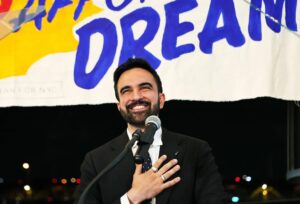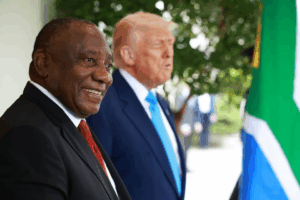By Saba Aziz
Amid rising Islamophobia, Muslim students show greater tendencies towards interfaith goodwill, a recent survey suggests.
Musbah Shaheen left war-torn Syria in 2013 to attend college in the United States.
As the then-19-year-old from Homs settled into student life at Vanderbilt University in Nashville, Tennessee, he was often asked about the conflict and life in Syria.
The conversations in hallways, classrooms and cafeteria with professors and fellow classmates also turned into more personal questions about his faith, he said.
“The biggest challenge for me in college was navigating the assumptions that people made about my religion,” Shaheen said.
Some were surprised that he did not have a beard, others that his sister did not wear a veil or that he ate meat. He felt like an outsider – misunderstood and stereotyped.
Musbah Shaheen is currently doing a PhD at The Ohio State University in Columbus, Ohio.
As a member of the Vanderbilt Interfaith Council, and later its president, Shaheen said weekly discussions and events on campus allowed him to connect with students of different faiths who were interested in expanding their world view while dispelling some of those misguided assumptions about Islam and Muslims.
Islamophobia is on the rise in the US, according to the annual Islamophobia index by the Institute for Social Policy and Understanding’s (ISPU), a think-tank based in Washington, DC.
Pluralism orientation
According to a national study by the Interfaith Diversity Experiences and Attitudes Longitudinal Survey (IDEALS), which tracked thousands of students from 122 institutions from their first semester of 2015 to their final year in 2019, Muslim students made the greatest progress pluralistically in college. About 1.5 percent of first-year (freshmen) students were Muslim in 2018.
IDEALS found that Muslim students began their college journey with strong pluralism scores – which capture goodwill towards people of other religious and non-religious perspectives, and preparedness to work across significant differences to solve common problems.
Commenting on the survey, IDEALS co-founder Matthew J Mayhew lauded the “resiliency” of Muslim students in the “face of an upward battle” and a “hostile” climate.
Survey results showing pluralism trends in US colleges.
Bengali American Sinthia Shabnam got involved in interfaith activities at North Carolina State University at a time when President Donald Trump signed an executive order in 2017 that banned travel for most nationals from several Muslim-majority countries, sparking outrage and confusion across the US.
Currently serving as the education director of NCSU’s Muslim Student Association, Shabnam says her top priority is to demonstrate approachability of Muslims on a predominantly white Christian campus. But as a hijab-wearing woman, she feels there is discrimination.
The number of anti-Muslim hate crimes and bias incidents surged after Trump took office in 2017, according to a report by the Council on American-Islamic Relations (CAIR).
CAIR attributed the rise to Trump’s travel ban, his frequent anti-Muslim comments and other policies targeting Muslims.
Other key findings, revealed by CAIR’s Dallas Fort-Worth (CAIR-DFW) chapter earlier this year suggested that 15 percent of students surveyed reported having their hijab tugged, pulled or offensively touched, while 41 percent of Muslim students were not comfortable engaging in class discussions about Islam and Muslims.
‘Major political shift’
Egyptian American Lela Ali is all too familiar with being discriminated against and called a “terrorist” from a young age.
“There has never been a moment where I didn’t feel like someone was trying to guess where I’m from, whether or not I spoke English, or if I was American,” said the 25-year-old graduate student at Duke University.
In 2016, Ali, along with two other African immigrant women, launched Muslim Women For, a Raleigh-based grassroots organisation advocating social justice, colour empowerment and political development.
Prayers to the Polls campaign was launched to educate and inform Muslims about early voting, rights at the polls, and polling locations in North Carolina
In an effort to get more Muslims to vote in the presidential elections this year, the non-profit group, launched the Prayers to the Polls campaign, providing free bus rides after Friday prayers from each mosque to a nearby early voting site for the primary election in Raleigh and Greensboro, North Carolina.
A 2018 ISPU report showed that growing Islamophobia pushed Muslim Americans to become more politically engaged.
According to Ali, a “major political shift” among Muslim Americans in the last decade has been led by young Muslims and Muslim students.
“Despite rising anti-Muslim bigotry and an administration that has directly attacked this community, young Muslims are not just organising around identity politics, but constructing power through cross-community building and reclaiming what it really means to be Muslim American,” she said. Al Jazeera


